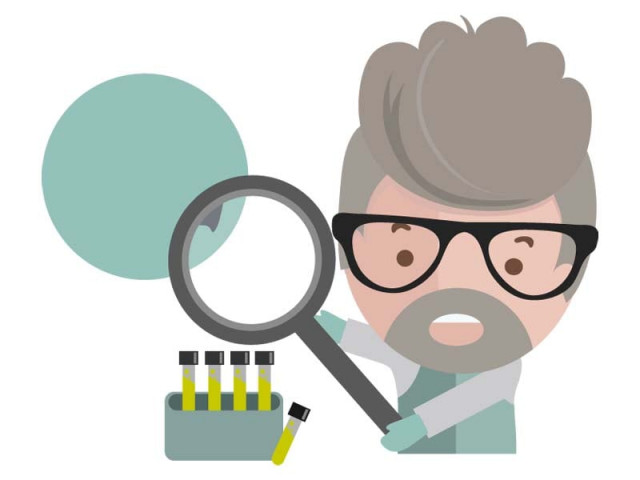Rising against Rett Syndrome
Could there be a silver lining to this cloud?

DESIGN BY HIRA FAREED
Aaizah’s story began with a chance diagnosis. When she started exhibiting a few symptoms, doctors failed to provide an accurate explanation and even misdiagnosed her as having autism or cerebral palsy. It was only after extensive browsing on the internet that Aaizah’s mother, Sana Kashif came across Rett Syndrome and realised Aaizah had already shown all of its indications. A visit to a pediatric neurologist confirmed the diagnosis.
Naturally, realising that a random genetic mutation was wreaking havoc within her daughter and that there was no way to stop it made life extremely difficult. That is when Sana discovered an online community for Rett Syndrome and sought counsel from it. And although the community gave her knowledge and courage, she felt the absence of a local support group strongly and yearned to be around her own people.
This was when she decided to take action. Sana established a platform called Rett Syndrome Pakistan to fill the void: a community to spread awareness about the disorder and provide guidance to families of children suffering from it. “I didn’t want any parent to go through what I did because sometimes, even family can’t help you through trying times,” shares Sana. “Having someone whose has experienced it themselves and can guide you through can be the greatest of blessings.” Through this group, Sana is available to anyone who seeks her. She helps parents attain inner peace and learn the best ways of caring for their ailing children.

Much like Aaizah, Shazia Karim* narrates that it took a long time for doctors to recognise her daughter’s symptoms as well. “It is the most traumatic experience, being told that your child has Rett,” says Shazia. “It is something one wouldn’t even dream of in their worst nightmares. You need all the support you can get,” she adds. According to Shazia, the initial shock is followed by the harrowing experience of helplessly witnessing your child go through ‘regression’ — a phase of the disorder wherein all the development the child has shown until the time is reversed, detaining them within mind and body. Unfortunately for the parents, this is just the start to a long and painful struggle.
Globally, the occurrences of Rett have been compiled and worked upon but it is distressing to know that no such research has been conducted in Pakistan. As a result, the occurrence of the disease is surrounded by ambiguity. “Rett has never been studied systematically in our population,” explains Dr Salman Kirmani, associate professor and chairperson at the Department of Pediatrics in Aga Khan University Hospital (AKUH) Karachi. “Prevalence in other parts of the world is roughly 1 in 9,000 to 10,000 girls, so it is expected to be at least that much here as well. One can safely say, that due to the lack of awareness and appropriate diagnostic testing, Rett syndrome goes undiagnosed in most patients.”
Nonetheless, Dr Kirmani claims things have already started improving for Rett patients in Pakistan. “A group of well-trained child development, neurology and genetics professionals have started to come together as a team that will address the problems of children with special needs, including Rett Syndrome,” he says. “They will further train other professionals to fulfill the needs of such children.” Dr Kirmani is also hopeful that the DNA test for MECP2 mutations will be available in Pakistan within the next two years.
Many other developments have taking place, and scientists are working hard towards finding a cure. “In the world of Rett, everything changed in February 2007, when Dr Adrian Bird demonstrated that features of Rett could be fully reversed in the animal model, even in advanced stages of the disease,” says Dr Aleksandra Djukic, director of the Tri-State Rett Syndrome Center and a professor of neurology at the Montefiore Medical Center in New York. It took about 33 years to discover the genetic routes of the syndrome and only eight years to develop a way to reverse its symptoms completely. Dr Aleksandra shares that there are seven clinical trials available for young patients that have led to the discovery that a “downstream gene target” may be able to ameliorate symptoms of Rett.
Dr Aleksandra is highly optimistic about the cure and shares that some of the available drugs can increase brain-derived neurotropic factors, improve regulation of metabolism and cholesterol and also stabilize the balance between excitation and inhibition in the brain. She reveals that researchers have completed the first phase of a trial with the MS drug in girls that were 10 or older. The drug led improvements in gait, memory, epileptic discharges on EEG and breathing in most of the girls treated. They have now launched phase two and are treating 20 patients with Stains. “We encourage families of Rett children to remain positive and keep their hopes high,” says Dr Aleksandra. “We appeal to their doctors, teachers and therapists to do all they can do to keep them in the best possible state while they await their better tomorrow.”
*Names have been changes for privacy
Rahat Kamal is a contributing writer at The Express Tribune and Independent PR writer and editor. She tweets @rahat_kamal.
Published in The Express Tribune, Ms T, November 8th, 2015.



















COMMENTS
Comments are moderated and generally will be posted if they are on-topic and not abusive.
For more information, please see our Comments FAQ